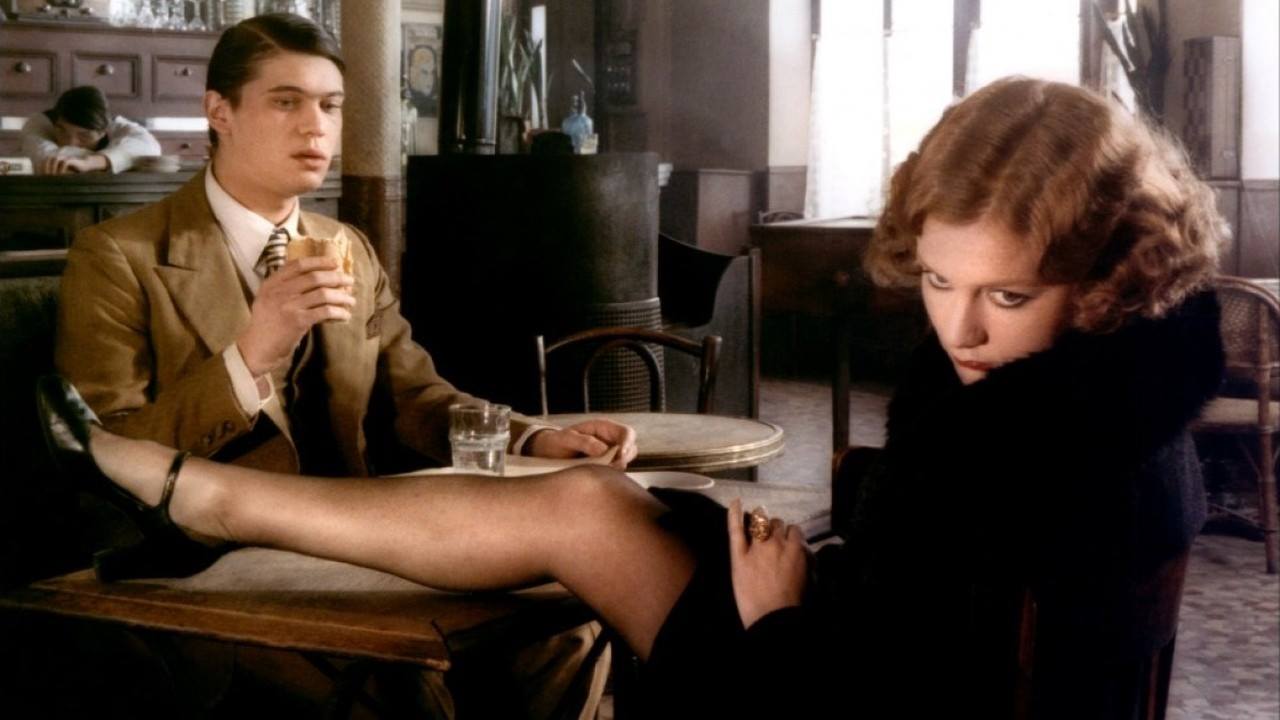Directed by Claude Chabrol | Starring Isabelle Huppert, Stéphane Audran, Jean Carmet
Claude Chabrol’s Violette is the cinematic equivalent of a poisoned macaron: it looks classy, smells vaguely French, and might kill you slowly from the inside. Based on the real-life case of Violette Nozière—France’s most notorious teenage parricide—this 1978 film serves up murder with a cold glass of milk and a cigarette-stained shrug. It’s elegant, infuriating, and about as warm as a tax audit.
And yet… you can’t look away.
Plot: A Teenage Girl Murders Her Father, and the Audience Watches Through a Fog of Gauloises
Set in 1930s Paris, Violette tells the true(ish) story of Violette Nozière (Isabelle Huppert), a moody teenager with a taste for lies, lace lingerie, and… patricide. She lives with her strict, blue-collar parents—her soft, teary-eyed mother (Stéphane Audran) and her father (Jean Carmet), whose idea of affection involves a healthy dose of repression and shame.
Violette leads a double life. By day, she’s a dutiful daughter studying hard. By night, she’s a sex worker, a petty thief, and a pathological liar—because why settle for just one? When her web of lies starts to close in, she does what any melodramatic French teenager in a Chabrol film might do: she poisons her parents. Dad dies. Mom clings to life. And Violette… well, she plays the victim like she’s auditioning for The Bold and the Batshit.
Isabelle Huppert: The Cold-Blooded Queen of Blank Stares
Huppert is a national treasure in France, like red wine or existential dread. In Violette, she is mesmerizing and terrifying. Her Violette is all contradictions: childlike, seductive, pitiful, monstrous. She speaks in soft tones, lies like it’s a second language, and manages to look both innocent and guilty at the same time. Basically, she’d kill on Dateline.
You can’t tell if she’s mentally unwell or just French. She’s both the black widow and the broken doll. One minute she’s playing her mother like a violin, the next she’s weeping dramatically in a court of law. And in the quietest moments, Huppert’s eyes tell you she’s at least three steps ahead of everyone—except maybe Chabrol, who’s enjoying the slow burn from the shadows.
Stéphane Audran: France’s Saddest Mother of the Year
Poor Madame Nozière. Stéphane Audran plays the mother with such aching sadness that you start to pity her just for existing in this movie. She’s meek, tearful, and constantly looking like she just smelled something disappointing. Her denial of her daughter’s depravity borders on criminal.
There’s a deep tragedy to her, even though the film doesn’t always explore it. In another movie, she’d be a hero. Here, she’s just another passenger on the slow train to patricide.
Jean Carmet: The Father Figure You’d Probably Want to Poison Too
Let’s talk about Daddy Dearest. Played by Jean Carmet with the emotional range of a soggy baguette, he’s stern, sexually creepy, and about as warm as a marble countertop. The real-life accusations against him were horrifying—Violette claimed he molested her, a claim that’s never fully confirmed or denied in the film. Chabrol lets the ambiguity hang in the air like cigarette smoke in a jazz bar.
Carmet’s performance doesn’t clear things up, but it sure makes you uncomfortable. He’s either a victim of slander or a predator who wore his pants too high. Either way, when he dies foaming at the mouth, you’re not exactly rushing to call an ambulance.
Direction: Chabrol, Slow and Deadly as Always
Chabrol doesn’t do rollercoasters. He does elevators in free-fall, one agonizing floor at a time. The film is slow, precise, and cold. He’s not interested in melodrama. He’s interested in psychology—the kind you find in French courtrooms and locked diaries.
He shoots scenes with surgical detachment, like a man documenting a car crash in slow motion. The color palette is drab, the score is sparse, and the pacing is the cinematic equivalent of watching toast brown—if the toast were laced with arsenic.
Chabrol isn’t here to thrill you. He’s here to dare you to care about a sociopath with good bone structure.
Tone: Cold, Cerebral, and About as Comforting as a Wet Beret
If you’re looking for warmth, empathy, or emotional release, go rent My Girl. Violette is about moral ambiguity, societal hypocrisy, and the bottomless well of human dysfunction. It’s a movie that invites you in for tea and then tells you your father might have deserved to be murdered. By the time the courtroom drama kicks in, you’re just hoping someone will start yelling to break the tension.
Even when Violette is being sentenced, you’re not sure how to feel. Sad? Satisfied? Queasy? All of the above?
This is dark French cinema at its most dispassionate. You will not be hugged.
Final Verdict: Decent, Depressing, and Deeply French
Violette is not a “fun” film. You won’t come away feeling good about humanity. But it is fascinating in the way dissecting a frog in high school was fascinating: a little gross, a little enlightening, and kind of stinky.
It’s a middle-of-the-road film only because it dares you to admire its cold craftsmanship while pushing you away with its total lack of sentiment. Huppert is magnetic. The story is shocking. The execution is… restrained to the point of suffocation.
Final Score: 5.5/10
-
+2 for Huppert’s dead-eyed brilliance
-
+1 for Audran’s tragic fragility
-
+0.5 for Chabrol’s frosty precision
-
-3 for making patricide somehow feel like a long French dinner with no dessert
-
-1 for the pacing, which is legally defined as “glacial”
Violette is an exercise in bleak psychological slow-burn. Just don’t expect to feel anything other than a low-grade existential crisis by the end. Bon appétit.



